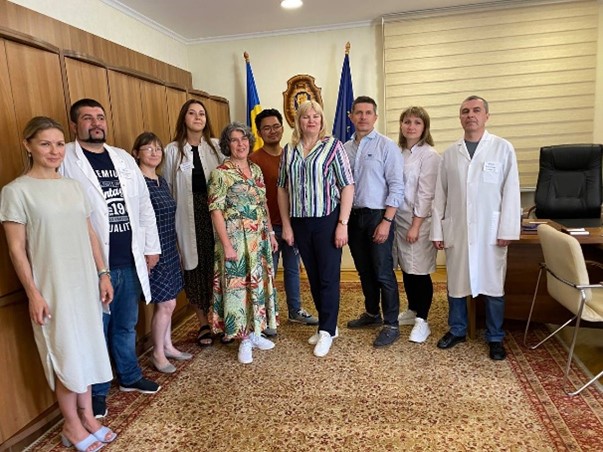Industrially produced trans fatty acids (TFAs) are detrimental to health as they elevate low-density lipoprotein cholesterol levels (commonly known as “bad cholesterol”), increase the risk of cardiovascular diseases, and have adverse effects on metabolic and inflammatory processes.[1] In 2020, Ukraine adopted stringent regulations (Order № 1613) to eliminate TFAs from the nation's food supply over three years.[2] These regulations set a vital public health standard by mandating that TFAs be restricted to less than 2 grams per 100 grams of total fat in all consumer foods, applicable to both physical retail and electronic commerce. Scheduled to take effect in October 2023, Ukraine faced formidable challenges in ensuring their smooth and effective implementation given the context of full-scale war since February 2022. Budgetary constraints, limited laboratory capacities for TFA analysis (supplies and workforce), and limited technical expertise, amongst other challenges, underscored the complexities of ensuring effective implementation and enforcement of the policy's objectives in the midst of wartime adversities. In response, Ukraine, in collaboration with WHO, took proactive measures to bolster its laboratory capabilities, facilitating enhanced proficiency in TFA analysis and enhancing the nation's capacity to monitor and enforce regulatory measures. This aligns with Output 3.2.1 of the 2022-2023 WHO Programme Budget “Countries enabled to address risk factors through multisectoral actions” and WHO’s 2022-2023 Biennial Collaborative Agreement with Ukraine. It is also a clear example of implementing “Delivering United Action for Better Health – a strategy for collaboration between the WHO Regional Office for Europe and Member States in the WHO European Region,” through a focus on tailored collaboration with a long-term strategic outlook. The WHO Regional Office for Europe has launched the Special Initiative on NCDs and Innovation to address NCD challenges during complex “perma-crises,” which includes wars, climate change, economic downturns, and pandemics. SNI follows a dual-track approach: "Race to Finish" accelerates key NCD “best buys” for quick impact, while "Vision 2050" ensures resilience for future generations. A priority in "Race to the Finish" is supporting Member States to become trans fat free.
“WHO supports Ukraine's efforts to remove trans fats from the food supply chain. The 'zero' trans fat policy is designed to safeguard Ukrainians from a leading cause of cardiovascular diseases. Furthermore, WHO is committed to providing ongoing support for capacity-building and situation assessments to ensure the successful execution of this project.”
-Jarno Habicht, WHO Representative for Ukraine
How did Ukraine, with the support of WHO, achieve this?
In May 2018, WHO called for the global elimination of industrially produced TFAs by 2023.[3] At the same time, WHO unveiled the REPLACE action package as a comprehensive roadmap for its Member States to swiftly and thoroughly eliminate industrially produced TFAs from their food supplies.[4] The six areas of action involve reviewing dietary sources of industrially-produced TFAs, promoting healthier alternatives, legislating/regulating to eliminate TFAs, monitoring TFA content in the food supply, creating awareness about the negative health impact of TFAs, and enforcing compliance with relevant policies and regulations. Ukraine’s Ministry of Health, guided by the REPLACE initiative (particularly Module 3: Legislate or Regulate) and technical guidance from the WHO Europe Special Initiative on NCDs and Innovation, adopted stringent regulations (Order № 1613) in 2020 to eliminate TFAs from the nation's food supply over three years.[5] This places Ukraine among the forty countries with best-practice policies for the elimination of TFAs.[6] Ukraine's resolve to eliminate TFAs further reinforces its alignment with European Union (EU) Commission Regulation 2019/649, thereby enhancing its commitment to the Association Agreement with the EU signed in 2014.[7]

Day one of an intensive six-day on-site training focusing on trans fatty acid and salt measurement in Ukrainian food products.
Photo credit: WHO Ukraine
Crucial for further implementing new national regulation are national laboratory capabilities for TFA analysis that support monitoring, enforcement, risk assessment, policy development, consumer protection, international trade, as well as public awareness efforts about the presence and health implications of TFAs in foods. Regrettably, Ukraine's skilled workforce in laboratories had diminished, primarily as a result of factors such as migration and conscription into the armed forces. In a proactive move to enhance its laboratory capabilities, Ukraine received vital technical assistance, supported by WHO Europe and Resolve to Save Lives. This assistance encompassed an intensive six-day on-site training specifically concentrating on the measurement of TFAs and salt in food products. Consequently, with funding from WHO Europe, Ukraine was able to conduct baseline studies on the food environment as part of the FEEDcities study.[8] This included the collection of baseline data on TFAs, salt, and potassium concentrations in foods.
Ukraine’s efforts, with WHO support, toward a normative framework to eliminate industrially produced TFAs from their food supply signal its proactive commitment to public health, international best practices, and the promotion of healthier food environments. WHO continues to provide guidance to Ukraine as it progresses towards achieving WHO validation for the elimination of TFAs through the WHO Validation Programme for TFA Elimination.[9] This Programme recognizes Member States that have implemented a normative framework to eliminate industrially produced TFAs from their national food supplies by awarding them a WHO Validation certificate. In prioritizing policy-driven strategies, including TFA elimination, despite the ongoing complexies of war and consequent challenges, Ukraine not only showcases resilience but also sets a global precedent. This underscores the country’s unwavering commitment to safeguarding the health of its citizens and inspiring hope for the future.
“Many countries in the WHO European Region have taken strong action to eliminate TFAs. We congratulate Ukraine on its efforts and encourage all countries in the Region to act as we move towards a TFA-free Region and prevent hundreds and thousands of unnecessary deaths each year. We look forward to promoting the country’s success through the Validation programme for trans fat elimination.”
-Kremlin Wickramasinghe, Regional Adviser for Nutrition, Physical Activity and Obesity, WHO Regional Office for Europe





